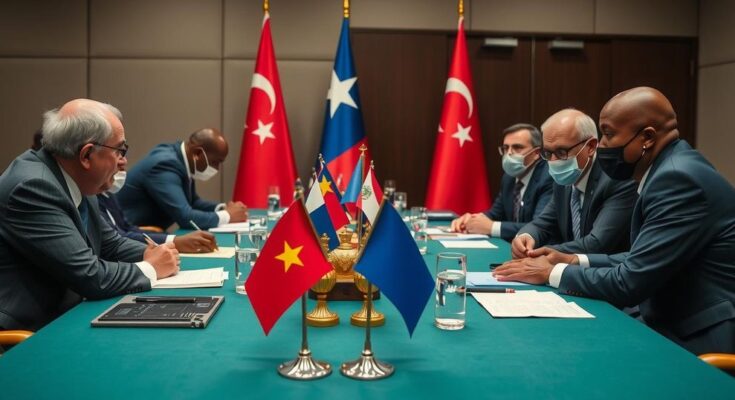The peace summit addressing conflicts in eastern DRC, set to be hosted by Angola, was canceled when the Rwandan delegation did not attend. Prior talks failed to establish a consensus on the M23 rebel group, prompting the Angolan government to postpone the meeting. The situation in eastern DRC remains unstable, with ongoing accusations between Rwanda and the DRC regarding military support and affiliations with rebel groups.
A scheduled peace summit, intended to mitigate the ongoing conflicts in eastern Democratic Republic of the Congo (DRC), was abruptly canceled. Angolan President Joao Lourenco had planned to convene with DRC President Felix Tshisekedi and Rwandan President Paul Kagame in Luanda to facilitate discussions. However, the summit was scrapped after the Rwandan delegation declined to attend due to unresolved tensions regarding the Congolese rebel group M23. The DRC Presidency confirmed this decision, indicating that the absence of Rwanda led to the cancellation of the gathering. While Tshisekedi arrived promptly for the summit, discussions held the previous day did not yield an agreement. The Rwandan Ministry of Foreign Affairs stated that the prior ministerial talks indicated a lack of consensus about pursuing negotiations with the Congolese rebels. This decision was deemed necessary to foster further dialogue between the DRC and the M23, as the ongoing instability persists in the eastern region, largely attributed to rebel group activities. The Luanda Process, a peace initiative launched in 2022 with the support of the African Union, aims to establish lasting stabilization efforts in the region, yet recent developments have hindered progress.
The eastern DRC has been plagued by persistent instability largely due to the activities of the M23 rebel group, which has gained significant territory and posed a considerable threat to security. The DRC government holds the Rwandan government responsible for allegedly providing military assistance to the M23, a claim that Rwanda refutes. Tensions have escalated as accusations fly between the neighboring countries, complicating any peace negotiations. The Luanda Process, aimed at addressing these conflicts, underscores the urgency to stabilize the situation and allow dialogue among all parties involved.
The recent cancellation of the peace summit serves as a setback in the ongoing efforts to resolve tensions between the DRC and Rwanda regarding the M23 rebel group. Lack of participation from Rwanda, combined with unresolved issues from previous ministerial talks, suggests that establishing a consensus remains challenging. Continued dialogue is necessary to progress towards stability in the eastern DRC and to address the humanitarian and security risks posed by the ongoing conflict.
Original Source: www.chinadailyasia.com




